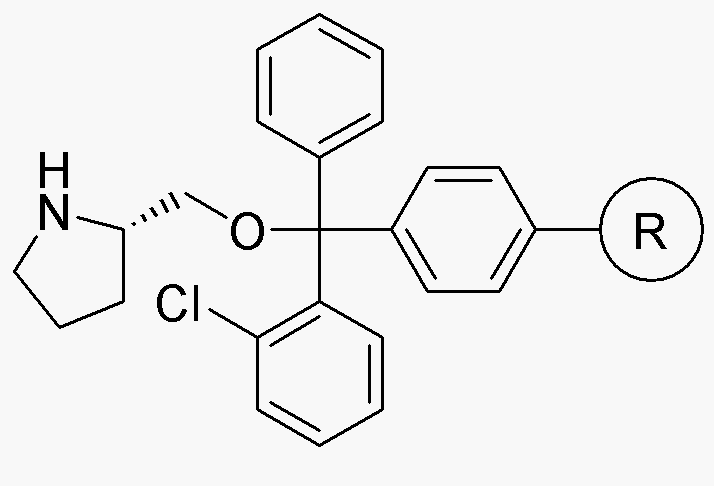L-Prolinol 2-chlorotrityl resin (0.2 - 0.6 meq/g, 200 - 400 mesh) is widely utilized in research focused on:
- Peptide Synthesis: This resin serves as a solid support for synthesizing peptides, allowing for efficient coupling reactions and facilitating the purification process.
- Drug Development: In pharmaceutical research, it is used to create libraries of peptide-based compounds, aiding in the discovery of new therapeutic agents.
- Bioconjugation: The resin can be employed to attach biomolecules, such as antibodies or enzymes, to surfaces, enhancing the functionality of diagnostic tools and biosensors.
- Material Science: It is useful in developing advanced materials with specific properties, such as drug delivery systems that release therapeutic agents in a controlled manner.
- Research in Organic Chemistry: The resin is valuable for studying reaction mechanisms and developing new synthetic methodologies, providing insights that can lead to innovative chemical processes.
General Information
Properties
Safety and Regulations
Applications
L-Prolinol 2-chlorotrityl resin (0.2 - 0.6 meq/g, 200 - 400 mesh) is widely utilized in research focused on:
- Peptide Synthesis: This resin serves as a solid support for synthesizing peptides, allowing for efficient coupling reactions and facilitating the purification process.
- Drug Development: In pharmaceutical research, it is used to create libraries of peptide-based compounds, aiding in the discovery of new therapeutic agents.
- Bioconjugation: The resin can be employed to attach biomolecules, such as antibodies or enzymes, to surfaces, enhancing the functionality of diagnostic tools and biosensors.
- Material Science: It is useful in developing advanced materials with specific properties, such as drug delivery systems that release therapeutic agents in a controlled manner.
- Research in Organic Chemistry: The resin is valuable for studying reaction mechanisms and developing new synthetic methodologies, providing insights that can lead to innovative chemical processes.
Documents
Safety Data Sheets (SDS)
The SDS provides comprehensive safety information on handling, storage, and disposal of the product.
Product Specification (PS)
The PS provides a comprehensive breakdown of the product’s properties, including chemical composition, physical state, purity, and storage requirements. It also details acceptable quality ranges and the product's intended applications.
Certificates of Analysis (COA)
Search for Certificates of Analysis (COA) by entering the products Lot Number. Lot and Batch Numbers can be found on a product’s label following the words ‘Lot’ or ‘Batch’.
Numéro de catalogue
Numéro de lot/série
Certificates Of Origin (COO)
This COO confirms the country where the product was manufactured, and also details the materials and components used in it and whether it is derived from natural, synthetic, or other specific sources. This certificate may be required for customs, trade, and regulatory compliance.
Numéro de catalogue
Numéro de lot/série
Safety Data Sheets (SDS)
The SDS provides comprehensive safety information on handling, storage, and disposal of the product.
DownloadProduct Specification (PS)
The PS provides a comprehensive breakdown of the product’s properties, including chemical composition, physical state, purity, and storage requirements. It also details acceptable quality ranges and the product's intended applications.
DownloadCertificates of Analysis (COA)
Search for Certificates of Analysis (COA) by entering the products Lot Number. Lot and Batch Numbers can be found on a product’s label following the words ‘Lot’ or ‘Batch’.
Numéro de catalogue
Numéro de lot/série
Certificates Of Origin (COO)
This COO confirms the country where the product was manufactured, and also details the materials and components used in it and whether it is derived from natural, synthetic, or other specific sources. This certificate may be required for customs, trade, and regulatory compliance.


